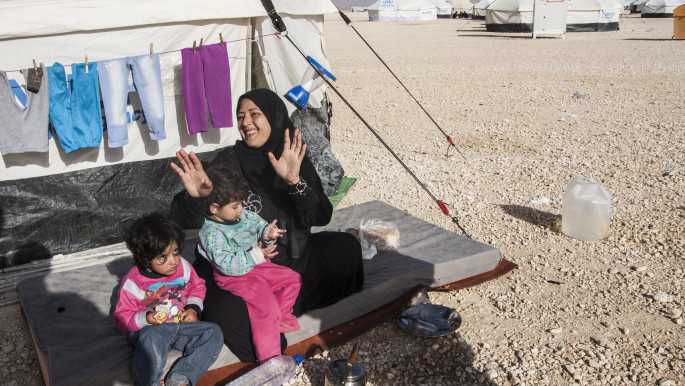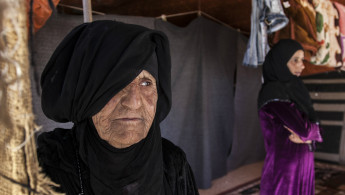The storytellers of Syria: Displaced women keep tradition and history alive with folktales
Oral storytelling is a continued living tradition in Syria. In social gatherings of family and friends, women are at the centre of this popular art form, telling stories that are transmitted between generations.
Since the beginning of the Syrian civil war in 2011, more than 600,000 Syrians have fled to Jordan. The displacement of Syrian communities to Jordan has transformed the themes and content of these stories, as well as how they are told.
Limited civil society efforts have been made to celebrate this tradition. Instead, the storytellers themselves, predominantly Syrian women, negotiate the future of oral histories.
Aisha is one of few Syrian storytellers to narrate stories in public gatherings in Jordan.
Each week, she tells a story to a preschool group at a community centre outside of Amman. Known to all as teta ["Grandmother"], the children run to greet her when she enters the room.
Aisha began by informally telling stories to other women, who also participate in events at the centre. When the centre's director first asked her to tell stories at the preschool, she hesitated. Telling stories to children and being responsible for her story was a new experience for her.
"Why should I keep my stories to myself?" she asks. She believes stories are meant to be shared, especially with the younger generation.
"The children benefit, and I do too," she reflects after one storytelling session. Her own grandchildren remain in Syria and she loves meeting the children at the preschool.
 |
Through storytelling, the younger generation connects with this history, which is largely unknown to them |  |
The realities of family separation are reflected in some of the stories Aisha tells. In one story, Aisha speaks of a grandmother who lives far from her grandchildren because of a war. In another, a boy must leave his father when he is conscripted into the army.
Like other Syrian storytellers, she draws upon lived experience combined with a long history of literature and folklore. Through storytelling, the younger generation connects with this history, which is largely unknown to them.
 |
|
| Many women say stories are meant to be shared, especially with the younger generation [Getty] |
Hiba, a retired teacher from Damascus, considers herself a storyteller within her own family, and sees the story as an important link between the present and the past for children.
"Our environment and society differ, but through stories we reconnect to our traditions and customs," she says.
| Do you speak Arabic? Listen to Hiba tell her story in her own words |
Hiba believes stories can strengthen children and teach them the importance of helping others.
In her classroom and her home, Hiba says that she first determines her goal for the story and then chooses the words to serve it, often intending to communicate a moral value or inspire her audience.
While oral stories are passed down between generations, flexibility is one of a story's defining features.
Zulaikha Abu-Risha, editor of Timeless Tales: Folktales Told by Syrian Refugees, comments that stories change according to the goal of the storyteller and the audience.
Timeless Tales, a bilingual anthology of folk-tales told by Syrian refugees and internally displaced people, celebrates Syrian oral storytelling traditions.
The project collected more than 250 folk-tales from Lebanon and within Syria, 21 of which were selected for inclusion in the anthology.
Abu-Risha transformed the stories from spoken Syrian dialect to Modern Standard Arabic. But she says she cannot call the stories Syrian stories, as such, and insists that the idea of "ownership" over the story is not relevant.
Instead, stories belong to popular literature and are for any person to narrate. The story exists in all regions of the world, with differences depending on the narrator and the environment.
Read also: Syrian refugees balance safety and hardship in Lebanon
At a time when Syrians around the world are faced with displacement and upheaval, Timeless Tales affirms the value of folk stories.
"There is a message hidden between the lines - the Syrian people are rich with stories and still living, trying to enjoy life," she says.
 |
There is a message hidden between the lines - the Syrian people are rich with stories and still living, trying to enjoy life |  |
Timeless Tales collaborated with the Hakaya Festival, held yearly in Amman, Jordan, to train storytellers to use these folktales as part of their repertoire and give the stories another chance to live.
Yet there are few initiatives like Timeless Tales and the Hakaya Festival - the storytellers themselves are shaping the future of this important tradition. In the context of forced displacement, stories are vulnerable to disappearance.
| Speak Arabic? Listen to Umm Ahmed's story in her own words |
Umm Ahmed, a mother from western Syria, memorised her grandmother's stories when she was young.
But since coming to Amman, she has forgotten all except one.
"Those who lived, forgot," she says.
The trauma she experienced affected her memory. Her own children did not grow up hearing their grandmother's stories - they spent their childhood hiding in the family's basement during a siege of their city.
Economic pressures present another challenge to storytelling - the cost of living in Jordan is expensive.
 |
|
| The Zaatari refugee camp shelters some 80,000 Syrian refugees on the Jordanian border [Getty] |
Umm Ahmed has been forced to seek out employment to support her family, leaving little time for relaxed social gatherings where stories might be shared.
The separation of Syrian families across the world also threatens a fundamental space for storytelling. The Future of Syria, a recent UNHCR project, highlighted the gravity of family separation. Of 202 children interviewed, 43 of them said one or more of their immediate family members was either dead, detained or missing.
Umm Ahmed and Hiba both recall late nights spent sharing stories with their family in Syria and note the impossibility of such gatherings today.
When Syrian storytellers such as Hiba and Aisha narrate a story, they respond to these manifold challenges to oral storytelling traditions.
Hiba believes there is only fear for the future of stories if peace does not return - and Umm Ahmed, despite losing her grandmother's stories, has hope that storytelling will continue after the war ends. Because of the courage of Syrian storytellers to speak, in the most difficult of circumstances, storytelling is not a dying art, but it is a changing one.
Catherine Cartier is a researcher who has spent four months investigating the folk narrative traditions of displaced Syrian communities. She is currently based in Tripoli, Lebanon, where she is researching the role of arts in conflict resolution.
Follow her on Twitter: @CatherineCarti5



